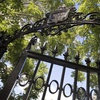Henry Louis Gates, the preeminent literary scholar within Afro-American studies today according to many of his colleagues, last week took the stage in Boylston Auditorium to talk about the problems of canon formation within the Afro-American literary tradition.
But the speech was far from a purely academic one. Gates, who is currently editing a Norton Anthology of Afro-American Literature, cautioned his audience against any Ivory Tower approach to Black literature. Instead of remaining sheltered "in the swaddling clothes of our academic complacencies," Gates said scholars must be aware of "the yawning chasm between our critical discourse and the traditions they discourse upon."
In Gates' talk, one could hear both the confidence of Black literary criticism and the doubts which have accompanied its rise in the field of Afro-American studies. For while Black studies is increasingly moving towards literature and away from history, some scholars worry that in the process, the political relevancy of the field may be diminshed.
This shift in the direction of Black studies away from history and towards literature will surely be felt at Harvard over the next few years, as the University's Afro-Am and English Departments both begin to rebuild their senior faculties.
Indeed, it may be symbolic of the new connections between literature and Afro-American studies that Gates has just been appointed chair of Harvard's Afro-Am Visiting Committee, a position he says he will use to help Harvard emerge as a leader in the field.
Another clue as to the future direction of Black studies at Harvard is the recent tenure offer to a major scholar of Black literature at Columbia.
Now that the shift has become a fact, many scholars in the field are trying to explain just why it occurred and just what the effects will be.
At a dinner with members of Harvard's Afro-Am Department following his talk, Gates and DuBois Professor of History and Afro-American Studies Nathin I. Huggins engaged in a long discussion on precisely this topic. Professors who atteneded the dinner said the night represented a kind of passing of the torch in Black studies from the older historian to the younger literary critic.
Professor of Law Derrick A. Bell, who has himself turned to fiction in his recent work on civil rights law, recalls the discussion between Gates and Huggins: "Basically, they said that the great thrust of Afro-American history was to correct the record--to show that Black folk played a very important role," Bell says. "But the historical role tended to be a correction of the record, while the literary people can provide a continuous range of views about the record."
When the first Afro-American Studies departments were born out of the turbulent student activism of the 1960s, it was the historians such as John Hope Franklin and John Blassingame--the first head of Yale's Afro-Am Department--who led the march toward developing the new discipline.
In a report that Huggins wrote for the Ford Foundation in 1985 on the state of Afro-American Studies, the Harvard historian says that "I have written here mainly of historians, in part because they were asked to play a major role in [the founding of] Afro-American studies." Huggins, whose report examines the future of the discipline as well as its past, went on to say that "to the extent there was a field, it depended on [the historians]."
Primarily, those historians saw their mission as righting the historical record of Black America's past, by reexamining studies of slavery and Reconstruction to emphasize the point that Blacks had indeed made their own history.
In attempting to explain the shift towards literature within Afro-American studies, scholars focus on three areas: the increasing complexity of the political issues surrounding Black Americans, the theoretical sophistication offered by feminist and deconstructionist approaches to literature and changes in the composition of academia.
As a consequence of the theoretical work being done by the literary critics, for the first time, many professors say, the field has really become defined as an academic, rather than political, discipline.
As Houston Baker, a University of Pennsylvania professor whose name is often mentioned with Gates, says, "The question by the end of the 1970s was how do you move largely political assertions about the autonomy of Afro-American culture and literature toward a more theoretical plane?"
Read more in News
Freshman SportsRecommended Articles
-
West Returns to Harvard, Joins Afro-Am Dream TeamC ornel R. West '74 is an icon. Three-piece suit. Starched shirt. Cufflinks. Full Afro. Limbs in motion, head thrown
-
Yale Afro-Am Chair Resigns After Remarks of Yale Pres.DuBois Professor of the Humanities Henry Louis Gates, Jr. thought he was returning to his alma mater , Yale, for
-
Carby Will Return as Yale Af-Am ChairHazel Carby rescinded her resignation as chair of Yale's African and African-American Studies Program last night, vowing to work with
-
Opening the Gates to an Afro-Am RevivalHenry Louis Gates Jr. sits comfortably in his spanking new corner office with confidence. Gates, chair of Afro-American Studies, says
-
Gates To Remain at Harvard Through Next YearAfter intense speculation that he would abandon Harvard this year, DuBois Professor of the Humanities Henry Louis “Skip” Gates Jr.,
-
Gates To Stay At Harvard Another YearAfter intense speculation that he would abandon Harvard along with several prominent colleagues this year, DuBois Professor of the Humanities













